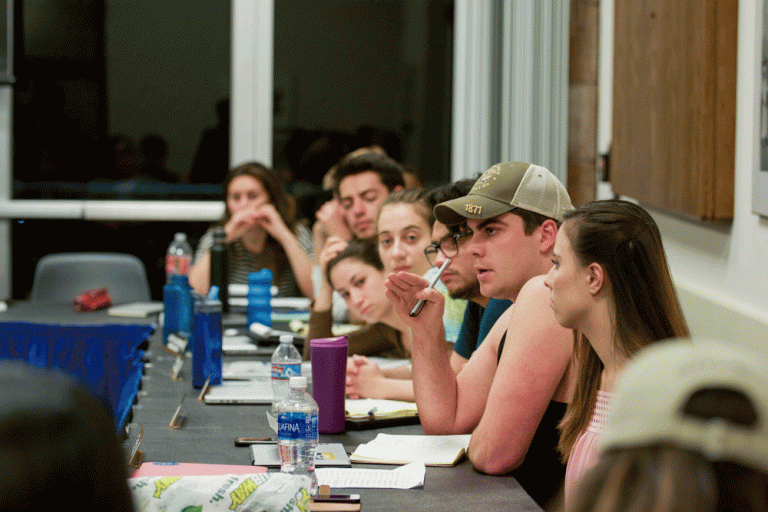
Madeleine Lee
Campus Beat Reporter
Student fees once again emerged as the crux of debate Wednesday night as chairs of several Associated Students entities advocated against a proposed bill that would increase the threshold for fee reaffirmation approval from a fifty percent vote to a sixty-six percent vote.
In a letter drafted by student representatives from several entities, including UCSB’s KCSB radio station and Isla Vista Tenants Union, students worried that the proposed threshold would “affect the ability [of entities] to deliver vital services to students.”
Daniel Renteria, vice president of the Isla Vista Tenants Union, urged senators to “consider the future ramifications of the proposal” and stood in solidarity with fellow concerned A.S. entity representatives despite the unlikelihood of IVTU being affected by changes in the reaffirmation threshold.
“We have been able to put out judicial workshops and advocate for rights of UCSB students and community members, said Renteria regarding IVTU, whose reaffirmation approval rate has been above the newly proposed threshold for the last decade. “All of this is made possible because of the decision students made decades ago to pass our lock-in fee at the threshold of 50 percent.”
The $127.70 quarterly A.S. fee, according to a budget approved by last year’s senate, paid by all undergraduate students on campus, is used to fund over 30 different AS entities.
Off-Campus Senator Cole Marting, primary author of the initial bill, acknowledged the work of all entities, but defended his position in proposing the bill as a means of “preventing a snowball effect” from occurring, in which students would continue to blindly approve small fee increases without seeing the big picture effects.
On the other hand, entity representatives were similarly concerned that students would fail to see effects on the broader scale.
“One of our concerns was that the student body would see this on the ballot and not really be given a full description of the implications and be like ‘oh reducing fees that sounds nice’ and then this goes into effect and certain things don’t exist anymore,” said KCSB General Manager Ally Gonzalez.
Internal Vice President Natalie Jordan ensured students that all ballot initiatives are accompanied by pro/con summaries drafted respectively by the bill’s proponents and detractors.
To deter senators from cutting student fees, entity chairs instead urged senators to look for alternatives that would still retain services as they work to make tuition more affordable for students and offset the effects of the 2017-2018 UC wide tuition increase. Renteria pushed senators to demand more state funding, while others pointed to UC Berkeley and UC Davis funding models.
“It isn’t fair to compare our campus to others, which have businesses that can supplement student fees,” said Gonzalez, referring to programs found at UC Berkeley and UC Davis that have student run coffee shops and bookstores whose profits are used to fund Associated Students campus programs.
Though senators took BCU concerns into account, the bill, initially proposed during the fourth week of the 2016-2017 winter quarter, did not follow correct legislative procedure when it was first proposed and was consequently tabled, as both Marting and Jordan emphasized at Wednesday’s meeting.
“It’s actually not a bill, it’s an elections board document,” said Marting. “The way it works is that you send it to elections, and then they put it in the form of an actual ballot, and then all ballot initiatives come to senate later on.”
On Friday, Marting released AS Elections Board’s official edits, which amended the initial 66 percent threshold to a 60 percent approval vote threshold. Senators on Wednesday told students to expect the bill to be up for discussion in senate by the first week of spring quarter.
According to A.S. Legal Code, if approved the initiative will serve as a constitutional amendment, which will require a two-thirds vote of approval from the student body in order to pass.










